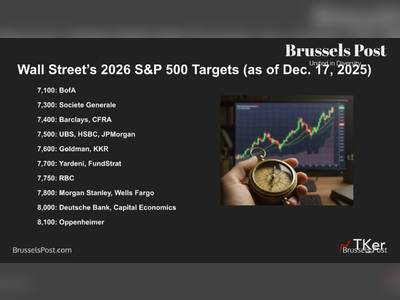
Navigating Uncertainty: The ECB’s Strategic Use of Scenario Analysis
How the European Central Bank enhances economic forecasting amidst global crises and unpredictability.
In an era marked by fluctuating economic realities and unforeseen global crises, the task of economic forecasting has become significantly more complex.
Central banks, such as the European Central Bank (ECB), traditionally rely on past data patterns and set assumptions to project future economic developments.
However, recent disruptions have necessitated a revamp of forecasting tools to accommodate structural changes and increased unpredictability.
According to a detailed post on the ECB Blog by experts including Matteo Ciccarelli, Matthieu Darracq Pariès, Bettina Landau, and João Sousa, the ECB has responded to this uncertainty by refining its macroeconomic projections through enhanced scenario, risk, and sensitivity analyses.
These methodologies aim to provide a broader understanding of potential deviations from the expected baseline and are becoming increasingly crucial.
The ECB’s traditional approach involved publishing standard baseline forecasts, which are seen as reliable in stable conditions.
However, in light of recent global upheavals, such as the COVID-19 pandemic and geopolitical tensions like the war in Ukraine, it has become clear that these forecasts need to be supplemented with additional analytical tools.
Understanding Scenario Analysis
Scenario analysis serves as a pivotal tool in the ECB’s strategic arsenal, offering a more comprehensive evaluation of potential economic scenarios.
Unlike sensitivity analysis, which focuses on how individual factors might affect economic outcomes, scenario analysis considers a broader array of hypothetical events that deviate substantially from the baseline.
This method examines the implications of major economic and geopolitical events, such as trade tariffs, housing market adjustments, and energy shocks.
Complementing the Baseline with “What If” Assessments
By incorporating sensitivity analysis, risk analysis, and scenario analysis, the ECB aims to enhance its forecasting robustness.
Sensitivity analysis isolates the impact of changes in certain variables, like energy prices or exchange rates, on the economic outlook.
Risk analysis examines the likelihood of deviations from the baseline, identifying potential asymmetries and providing insights into the balance of risks affecting policy decisions.
Scenario analysis, however, takes a more holistic view by considering the wider implications of hypothetical shocks on the economy.
This approach includes assessing additional shocks over the projection horizon and altering the features of macroeconomic propagation mechanisms.
Recent Applications and Global Context
The necessity of scenario analysis became evident during the COVID-19 pandemic, where it was used to model varying assumptions and potential outcomes.
This approach helped the ECB understand and communicate the driving forces behind economic changes, aiding in strategic decision-making.
More recently, scenario analysis has been instrumental in evaluating the economic repercussions of geopolitical tensions, such as the conflict in Ukraine.
Scenarios developed by the ECB anticipated the impact of rising energy prices on inflation, offering foresight that standard sensitivity analysis struggled to provide.
Importance for Global Policymaking
Scenario analysis not only enriches the ECB's forecasting mechanisms but also plays a vital role in global economic policymaking.
As the world grapples with heightened uncertainty, these robust analytical tools enable policymakers to prepare for diverse contingencies and formulate informed strategic directions.
The ECB's experience underscores the value of scenario analysis as an essential complementary tool in macroeconomic projections, reinforcing its capacity to adapt to and anticipate risks in a rapidly changing world.
While standard projections often overlook improbable but impactful “Black Swan” events, the ECB acknowledges the importance of scenario analysis in contemplating such extreme possibilities.
This foresight remains crucial, especially when addressing significant uncertainties like those experienced during the pandemic.
The views expressed in the ECB Blog represent those of the authors and may not necessarily align with the official stance of the ECB or the Eurosystem.
Central banks, such as the European Central Bank (ECB), traditionally rely on past data patterns and set assumptions to project future economic developments.
However, recent disruptions have necessitated a revamp of forecasting tools to accommodate structural changes and increased unpredictability.
According to a detailed post on the ECB Blog by experts including Matteo Ciccarelli, Matthieu Darracq Pariès, Bettina Landau, and João Sousa, the ECB has responded to this uncertainty by refining its macroeconomic projections through enhanced scenario, risk, and sensitivity analyses.
These methodologies aim to provide a broader understanding of potential deviations from the expected baseline and are becoming increasingly crucial.
The ECB’s traditional approach involved publishing standard baseline forecasts, which are seen as reliable in stable conditions.
However, in light of recent global upheavals, such as the COVID-19 pandemic and geopolitical tensions like the war in Ukraine, it has become clear that these forecasts need to be supplemented with additional analytical tools.
Understanding Scenario Analysis
Scenario analysis serves as a pivotal tool in the ECB’s strategic arsenal, offering a more comprehensive evaluation of potential economic scenarios.
Unlike sensitivity analysis, which focuses on how individual factors might affect economic outcomes, scenario analysis considers a broader array of hypothetical events that deviate substantially from the baseline.
This method examines the implications of major economic and geopolitical events, such as trade tariffs, housing market adjustments, and energy shocks.
Complementing the Baseline with “What If” Assessments
By incorporating sensitivity analysis, risk analysis, and scenario analysis, the ECB aims to enhance its forecasting robustness.
Sensitivity analysis isolates the impact of changes in certain variables, like energy prices or exchange rates, on the economic outlook.
Risk analysis examines the likelihood of deviations from the baseline, identifying potential asymmetries and providing insights into the balance of risks affecting policy decisions.
Scenario analysis, however, takes a more holistic view by considering the wider implications of hypothetical shocks on the economy.
This approach includes assessing additional shocks over the projection horizon and altering the features of macroeconomic propagation mechanisms.
Recent Applications and Global Context
The necessity of scenario analysis became evident during the COVID-19 pandemic, where it was used to model varying assumptions and potential outcomes.
This approach helped the ECB understand and communicate the driving forces behind economic changes, aiding in strategic decision-making.
More recently, scenario analysis has been instrumental in evaluating the economic repercussions of geopolitical tensions, such as the conflict in Ukraine.
Scenarios developed by the ECB anticipated the impact of rising energy prices on inflation, offering foresight that standard sensitivity analysis struggled to provide.
Importance for Global Policymaking
Scenario analysis not only enriches the ECB's forecasting mechanisms but also plays a vital role in global economic policymaking.
As the world grapples with heightened uncertainty, these robust analytical tools enable policymakers to prepare for diverse contingencies and formulate informed strategic directions.
The ECB's experience underscores the value of scenario analysis as an essential complementary tool in macroeconomic projections, reinforcing its capacity to adapt to and anticipate risks in a rapidly changing world.
While standard projections often overlook improbable but impactful “Black Swan” events, the ECB acknowledges the importance of scenario analysis in contemplating such extreme possibilities.
This foresight remains crucial, especially when addressing significant uncertainties like those experienced during the pandemic.
The views expressed in the ECB Blog represent those of the authors and may not necessarily align with the official stance of the ECB or the Eurosystem.
AI Disclaimer: An advanced artificial intelligence (AI) system generated the content of this page on its own. This innovative technology conducts extensive research from a variety of reliable sources, performs rigorous fact-checking and verification, cleans up and balances biased or manipulated content, and presents a minimal factual summary that is just enough yet essential for you to function as an informed and educated citizen. Please keep in mind, however, that this system is an evolving technology, and as a result, the article may contain accidental inaccuracies or errors. We urge you to help us improve our site by reporting any inaccuracies you find using the "Contact Us" link at the bottom of this page. Your helpful feedback helps us improve our system and deliver more precise content. When you find an article of interest here, please look for the full and extensive coverage of this topic in traditional news sources, as they are written by professional journalists that we try to support, not replace. We appreciate your understanding and assistance.











